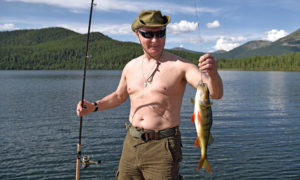If you are impatient with the calibre of potential partners in your city, Tinder has a feature for you. For £18 a month, you can “passport” to another place; that is, you can set your location to anywhere in the world. Tel Aviv, Jeddah, Moscow, Kyiv. Tinder’s blandness, combined with the fact that matchmaking is a universally smiled-upon process, has allowed it to operate as a politically-neutral entity — even in sexually repressive or war-torn regimes.
It’s well-documented that social media is playing a vital part in this conflict: Ukrainians with working smartphones are publicising the terrifying experience of having their home invaded. But in Russia, Facebook, Twitter, TikTok and Instagram have all been banned, leaving all but the most determined with nothing but fake news and propaganda.
Tinder, though, continues to operate normally. Some in the West have passported to Moscow to talk with beleaguered Russians and find out what their lives are like now. But others are passporting with more explicit political aims. A Slovakian media agency has launched an initiative called Special Love Operation, which encourages Tinder users to bombard Russian singles with images from the war in Ukraine to show them what’s really going on. “The Russians do not know the truth about the war in Ukraine,” its website reads. “Putin ignores the whole world, but maybe he doesn’t ignore his own people. We found a way to bypass censorship on Tinder.”
The agency tells users to change their profile picture to a selfie with a picture of a war-torn Ukrainian city (it provides 12 images), and change their profile description to a paragraph in Cyrillic, which reads: “Please don’t turn away, don’t turn a blind eye — innocent people like you and me are dying in Ukraine. They too wanted love, [to] live and get acquainted — now they sit in basements … lose their loved ones and relatives, freeze.”
Tinder has also become a way to connect meaningfully with those on the ground in Ukraine. Many in the West are desperate to help Ukrainians — especially since the refugee schemes were announced, and then promptly descended into chaos. Tinder has become one way for those in the UK keen to sponsor a refugee through the government’s scheme to connect with someone in need of shelter, albeit a mode uncomfortably adjacent to sex.
Curious, I decided last week to revive my Tinder. I was reporting in Dubai at the time, so started by swiping past a warning that I was in a country that did not respect LGBTQ rights, into a sea of slick-haired men looking for, among other things, “nothing serious”. With a few taps, I had upgraded my Tinder account so that I could passport — not to news-bomb or refugee-seek, but to hear what people are thinking, doing and feeling in both Russia and Ukraine. After all dating apps, unlike Twitter, encourage people to share their thoughts privately.
I swiped in Moscow for a few days, and then in Kyiv and Odessa, sending messages that were as transparent as possible: I made it clear that I was concerned and curious to hear the perspective of individuals caught up in a hyper-reported crisis. I was friendly but non-flirtatious. I set my search to both men and women but got messages — and responses — only from men. The dozen or so from each country who I communicated with seemed content to converse without any sexual or romantic overlay, though a couple of Muscovites offered to show me around their city in the hazy future when this was all over.
For some Russians, everyday life has transformed since the invasion. With the mass exodus of Western companies, many connections with the outside world have been abruptly severed, along with options for getting out physically (flights to and from 36 countries, including the EU, the US and UK have been banned). My first Russian connection, a pale young call centre worker who remotely helps people fix their cars, messaged in under a minute after I swiped: “I would love to leave Moscow, from Russia. Maybe you can help me.”
He was translating his Cyrillic into English online and asked me to do the same. I enquired about the situation and what he thought of it. “I am very glad that I do not watch the TV that we have,” he told me. “I’m against. Now the sanctions this month are just beginning to feel them. We will feel them after April 1, when there will be nothing on the shelves, and in 3 months people will go hungry. Can we call on WhatsApp? I will show you a photo … Will you help me?”
I replied that I hoped he would be ok, and we should stay in touch, but I was unsure how I could help him. Still, his profile picture, in which he smiles wanly before St Basil’s, haunts me; I have checked in daily, getting ever-terser bursts of Cyrillic in response.
Most of the men I spoke to in Russia, though, didn’t share his negative view of Putin’s actions. Nikolay, 25, a cocky banking analyst, revealed a frankly sinister perspective. His profile picture featured a man’s silhouette licking a stiletto at the end of a long leg. He said sanctions had had little impact: his work “just reviewed our project pool from Europe to more domestic and east”. He added, “flexibility is key”, with an emoji of a smiling face with a halo. The fact that McDonalds has abandoned its Russian outlets, he said, has just made room for some “cool, a bit more expensive but tasty” Russian equivalent. “The only point is Instagram perhaps.”
As for the invasion: “Putin is the face of Russian community and basically nearly 85-90 per cent see eye to eye … Most Russians understand the reason of it and support our military and I as a former soldier but we regret that we are supposed to kill our ex bros as they were fooled by US.” I asked what he meant by that. “Do you believe US are willing to bring peace and prosperity to Ukraine and other countries they interfere in?” he responded. It’s a question that many Western liberals have posed.
But then Nikolay expanded, warning that the West, like the Roman empire, had become too decadent, and was in for a shock. “I would like my children to raise up healthy, know the history as is it, realize that boy is a boy and girl is girl and to fuck ur friend isn’t appropriate cos then ur nation will die … Western world lost when these things became normal.” And then came Hitler. “Except for the worst things Hitler did he got some good ideas concerning the concept of Europe.” Shocked, but pretending not to be, I asked what he meant. “He made Europe decide how to live, not States”.
Nikolay’s analysis was particularly wide-ranging, but his view of the West as corrupt and devious cropped up repeatedly among the men I chatted to. Alex claimed: “Ukraine bombed Donbas for 8 years, in fact, the US and London benefit from this conflict, since they always have tried to do meanness to the Russians.” “The sanctions spoiled life a little,” he admitted, “but not much.” He was one of the men who offered to show me around Moscow “when the crisis is over.”
Until I passported, the Russian perspectives I’d heard were mostly outraged, against the war, intent on protest and appalled by Putin. But Tinder revealed that a plenty of educated young people do not share that view, offering a depressing glimpse at how deep the Russian threat goes: this is not, after all, a question of one isolated ruler running amok. At the very least, it seems that Russian propaganda has been successful, where the young men I matched with — most of whom had good English and seemed middle class — were concerned. Alex told me, “we don’t really want to fight, it’s just that some countries don’t keep their promise, and so I like London, and people too.”
The Ukrainians I spoke to were less verbose, but didn’t shy away from the need to fight. Vitaly, in Kyiv, said, “the war is going on and we need to fight! It’s scary, but we’re strong and we’ll win!” Alex said some of his friends had joined the army, but that he was working on some “social projects.” I asked about mandatory universal conscription for all men of fighting age, and he clarified that it was “not really all, yet.” His project was “psychological help for Ukrainians and info project to show mental trauma civil people get while the conflict.” He was “also launching YouTube video soon.”
Navigating a world of real disaster, peril, anxiety, and fear — all from a comfortable perch in the West — I had expected that the panic and misery communicated by the Muscovite car mechanic would be more widespread, particularly in Ukraine. But instead, the men I matched with seemed either to feel relatively safe, or keen to appear unruffled. The fact that they had time to be on the dating app, of course, suggests they weren’t in the thick of the conflict.
Except, as Russian troops have made clear, you don’t have to be on the sidelines to be on Tinder. There have been reports of Russian troops bombarding Ukrainian women with messages in towns they are about to literally bombard, giving away their classified locations as they go. Dasha, a young woman in Kharkiv, matched with a number of soldiers, including a bearded Chechen fighter calling himself Black. She ended up talking to Belgorod-born Andrei, whose picture showed him in full combat gear wielding a Kalashnikov. “I love travel to Asia, particularly Thailand,” he told Dasha. “But now it’s a difficult time … because no one likes Russia right now.”
Kyiv was also my first taste of Tinder as refugee-sorting tool. I matched with Tom, an Englishman in his 30s, whose profile said he was looking to find someone to sponsor to come and live in his house. There was not a trace of sexual innuendo on his profile. But surely the men using a dating app to find a Ukrainian refugee to house are at least partially aware that Ukrainian women are reputed to be the most beautiful and brainy in the world.
Tom’s opening message to me was all business: “Hi, are you interested in the room/visa sponsorship?” I replied with the truth, asking him how it was going. “It’s proving to be quite difficult as I don’t think the UK’s policy has been published very well,” he wrote, echoing the widespread criticism of those trying to navigate it.
Whether people like Tom’s intentions are entirely innocent is hard to know; humanitarian, political and sexual goals are difficult to distinguish on the battleground of Tinder. But this conflict has highlighted that dating apps can go beyond their basic function, even if the promise and dangers of sex lurk in the background. Where other social media are mouthpieces, possibly to a vast audience, Tinder offers a more intimate view. And so long as it’s used carefully, the app could prove to be one of many powerful yet non-violent weapons in this war.
Disclaimer
Some of the posts we share are controversial and we do not necessarily agree with them in the whole extend. Sometimes we agree with the content or part of it but we do not agree with the narration or language. Nevertheless we find them somehow interesting, valuable and/or informative or we share them, because we strongly believe in freedom of speech, free press and journalism. We strongly encourage you to have a critical approach to all the content, do your own research and analysis to build your own opinion.
We would be glad to have your feedback.
Source: UnHerd Read the original article here: https://unherd.com




